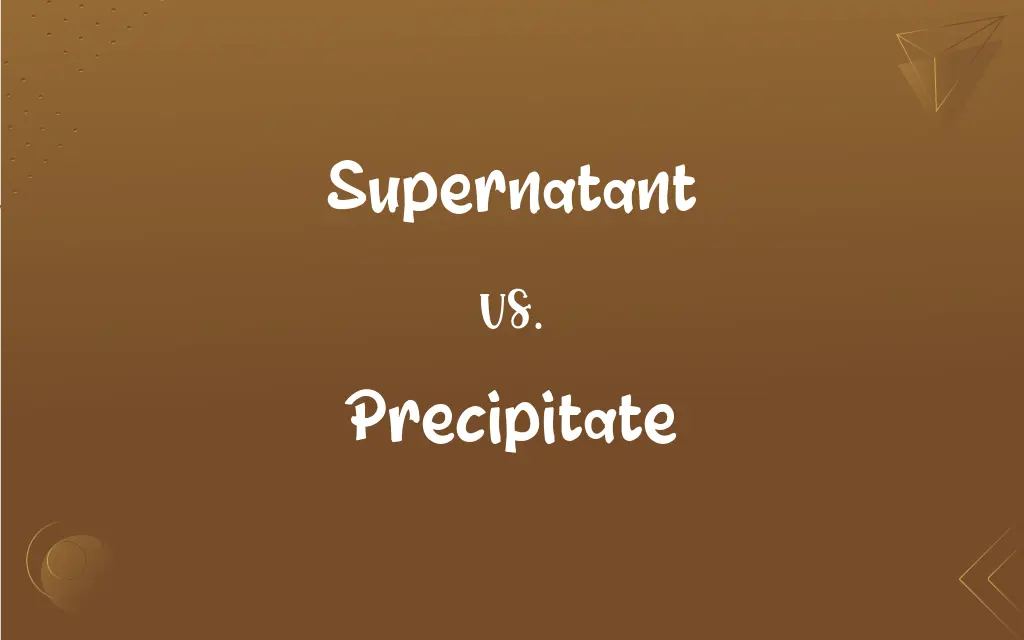Supernatant vs. Precipitate: What's the Difference?
Edited by Janet White || By Harlon Moss || Published on December 21, 2023
The supernatant is the clear liquid above a settled precipitate; the precipitate is the solid that falls out of a solution.

Key Differences
The supernatant refers to the clear liquid remaining above the solid residue after a mixture has settled, while the precipitate is the solid formed when a substance is chemically separated from a solution. Both terms are used in chemistry to describe different phases of a reaction.
In a chemical reaction, the supernatant is the part of the mixture that remains in the liquid state, often clear and free of suspended particles. On the other hand, the precipitate is the insoluble solid that settles out of the solution or is formed as a result of the reaction.
The supernatant can be separated from the precipitate through decanting, centrifugation, or filtration. While the supernatant is typically a solvent containing dissolved substances, the precipitate is the undissolved substance that can be isolated and studied.
During analysis, the supernatant might contain important dissolved chemicals that indicate reaction progress, whereas the precipitate can be a product of the reaction or impurities being removed from the solution.
The physical appearance of the supernatant can indicate the success of a chemical reaction, such as clarity or color change. In contrast, the precipitate's characteristics like color, texture, and quantity provide insights into the reaction's nature and products.
ADVERTISEMENT
Comparison Chart
State of Matter
Liquid
Solid
Formation Process
Remains after solid settles
Forms and settles out of a solution
Physical Appearance
Typically clear and free of suspended solids
Visible solid particles
Method of Separation
Decanted, centrifuged, or filtered off
Settles by gravity or is filtered out
Role in Chemical Analysis
Often analyzed for dissolved substances
Analyzed for reaction products or impurities
ADVERTISEMENT
Supernatant and Precipitate Definitions
Supernatant
Liquid layer above settled solid in a mixture.
After centrifugation, the supernatant was carefully decanted.
Precipitate
Substance separated out from a solution.
The precipitate was filtered and dried for weighing.
Supernatant
Non-solid part of a solution post-precipitation.
The chemist examined the supernatant for any remaining reactants.
Precipitate
Solid formed from a chemical reaction in a liquid.
The reaction produced a white precipitate.
Supernatant
The upper layer of liquid after settling or centrifugation.
He carefully extracted the supernatant without disturbing the sediment.
Precipitate
Insoluble solid that emerges from a liquid solution.
A cloudy precipitate indicated the presence of the targeted compound.
Supernatant
Liquid remaining after solid particles settle.
The supernatant was used for further chemical analysis.
Precipitate
Solid particles that settle at the bottom of a solution.
The precipitate was collected and analyzed for its composition.
Supernatant
Clear fluid separated from solid material.
The supernatant in the test tube was clear, indicating no suspended particles.
Precipitate
Result of a substance's reduced solubility.
The change in temperature caused the compound to precipitate out.
Supernatant
Floating on the surface.
Precipitate
To cause to happen, especially suddenly or prematurely
An announcement that precipitated a political crisis.
Supernatant
The clear fluid above a sediment or precipitate.
Precipitate
To cause to fall down from a height; hurl downward
"The finest bridge in all Peru broke and precipitated five travelers into the gulf below" (Thornton Wilder).
FAQs
Can precipitate be redissolved?
Sometimes, depending on the chemical properties.
How is supernatant removed?
By decanting, centrifuging, or filtering.
Is supernatant always clear?
Usually, but it can be colored if it contains dissolved substances.
What is a precipitate?
A solid formed in a solution during a chemical reaction.
Why is supernatant important in experiments?
It can contain dissolved reactants or products for analysis.
Can precipitate be toxic?
Depends on its chemical composition.
What is supernatant?
A clear liquid remaining above a solid sediment.
Can the volume of precipitate indicate reaction efficiency?
Yes, it can provide insights into reaction completeness.
What indicates a precipitate formation?
A change in solution's clarity or color.
How can you tell if a supernatant is pure?
Through chemical analysis and clarity assessment.
Can supernatant be reused in experiments?
Yes, if it retains necessary reactants or properties.
What precautions are needed when handling supernatant?
Depending on its composition, use appropriate safety measures.
What factors affect precipitate formation?
Concentration, temperature, and pH of the solution.
Does supernatant contain suspended particles?
Typically, no. It's the clear liquid above solids.
Why might a precipitate not form as expected?
Incorrect reactant proportions, temperature, or contamination.
Can supernatant change color during a reaction?
Yes, indicating the presence of certain substances.
Can both supernatant and precipitate be important in analysis?
Yes, both can provide valuable information about the reaction.
What are common methods to induce precipitation?
Adding reagents, changing temperature or pH.
Is precipitate always visible?
Mostly, but some are very fine and hard to detect.
What is the role of centrifugation in separating supernatant?
It speeds up sedimentation of solids for easier removal.
About Author
Written by
Harlon MossHarlon is a seasoned quality moderator and accomplished content writer for Difference Wiki. An alumnus of the prestigious University of California, he earned his degree in Computer Science. Leveraging his academic background, Harlon brings a meticulous and informed perspective to his work, ensuring content accuracy and excellence.
Edited by
Janet WhiteJanet White has been an esteemed writer and blogger for Difference Wiki. Holding a Master's degree in Science and Medical Journalism from the prestigious Boston University, she has consistently demonstrated her expertise and passion for her field. When she's not immersed in her work, Janet relishes her time exercising, delving into a good book, and cherishing moments with friends and family.






































































